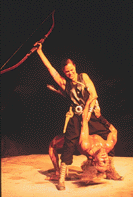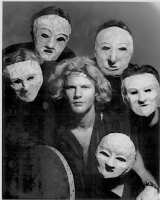 FEATURES
FEATURES
RADICAL REWORKINGS
Staging The Iliad
By Peter Meineck
Aquila Productions
In the fall of 1995 my theatre company, Aquila Productions, toured a staged version of Homer's Iliad in the United States. This adventure into the world of epic poetry was a new direction for Aquila. Since its inception in 1990, the company has presented 12 shows and although more than half have been new productions of ancient Greek plays, this project proved to be something very different and dramatically illuminating.
My first contact with Homer was probably the same as most people's: I read it at school. I also remember a large picture book I used to delve into as a child with magnificent colour pictures of Greek heroes clashing in battle and disinterested gods looking on from Mt Olympus. For us The Iliad exists in written form as a text, a piece of literature, but as we all know its roots and primary function are the spoken rather than the written word, the medium of ancient bards who told the tale to rapt listeners.
As members of a theatre company working on Greek drama, we found ourselves referring to The Iliad time and time again. It was an essential tool for background material to the characters and thematic content of the plays we were presenting. This contact with Homer in a dramatic context led from individual research on the part of the actors to active discussion and eventually rehearsal readings. It was at that point that we began to hear Homer. Even in translation, the story resonated with dramatic power and the words on the page cried out to be spoken. In this way the seed of an idea was planted and the decision to attempt a staging of The Iliad began to germinate.
The actor's performance and the production values as a whole must be rooted in truth; only then can the performance breathe passion, excitement and danger. These elements are essential for staging ancient drama. Greek plays that present false rituals, contrived language, and artificial performances will always fail to engage an audience on a personal level. From a truthful performance comes the ability to provoke imagination, that most personal and private facet of the audience member. Greek drama in particular seems to have been a theatre where imagination ruled, with its sparse staging, descriptive language, actors in multiple roles and, of course, the mask. We applied our policy of Truth and Imagination to every aspect of The Iliad.
Every show needs its own theatrical world, namely the environment that the production lives in. This is the essential concept that informs the set, costume and lighting design. It gives the actors a reference point, and underpins their individual performances. With truth in mind we looked to our own past for inspiration. Aquila prides itself on having actors from all corners of the United Kingdom. The assembled Iliad/Macbeth cast (The Iliad toured with Macbeth) boasted performers from Scotland, Northern Ireland, The North East, The Midlands and London. Many of us had Celtic backgrounds or came from a part of the country rich in Celtic culture. We had visited this ancient Celtic world once before with our production of Philoctetes, and it had served us incredibly well. If anything, it fit The Iliad even better. I have always envisioned the world of Homer in terms of Clans and Chiefs rather than Countries and Kings. Now an ancient story of warriors, gods, war-prizes, plagues and omens could leap off the page and spring into life.

While working on Greek drama, we had come to realise that a trust in the work's essential structure would always reap rich rewards. The more we understood the plays we were staging the more adventurous they became. With structure in mind, we decided not to attempt to distil the whole Iliad into one evening. Nor did we feel it right to plunge head first into one of the later books. Instead we settled on Book One. We began at the beginning. This decision served us well. We found Book One remarkably well constructed and highly dramatic. If we could entice our audience into the world of Homer with Book One, then we could leave them with the desire to learn more, to know the rest of the story. This could only encourage them to re-acquaint themselves with the text, or in many cases bring them into close contact with Homer for the very first time. We also hoped that those who knew Homer well would derive a new enjoyment and appreciation from receiving the work in a dramatic context. Our goals were clear.
The Celtic motif was perfect for a storytelling presentation. The British Isles once housed one of the richest traditions of storytelling and epic poetry in the world. The Celts were renowned for their skill in this respect and their oral tradition was highly developed and deeply respected. Many Roman commentators, including Caesar, Cato and Diodorus Siculus, acknowledged this. The Celtic version of Heracles was a master of the spoken word; that was where his strength lay. A residue of this amazing oral culture can still be found in the folk traditions Scotland, Wales, Cornwall and Ireland.
We decided against dividing text among different characters and built the production around a central story-telling figure, our 'Homer'.
Homer was played by Peter Hilton, an Aquila stalwart, who was well equipped with the necessary vocal range, stamina and flexibility to bring the words to life. Peter's background in Musical Theatre, as well as his Classical training, stood him in good stead for this role. We could have stopped there; it would have been more 'authentic' and we might have made some money for once! But the images thrown up by the text during readings cried out for some form of realisation. Perhaps this is the main difference between the modern and the ancient audience: we demand visual stimulation. We need a picture, something to see, when we are entertained by the Television, the Cinema or even the Theatre. We had to consider our audience and give them more than just words if we wanted to draw them into our dramatic world and hold their attention. The world of The Iliad can be quite impenetrable at times: so much of the culture described is alien to us now. As a result a visual language was devised to further enhance the text, to provoke and stimulate without depriving the words of their power to inspire imagination, and to elicit a personal response. To this end, a cast of five gathered around Peter's central figure to underscore his words with movement, music, and masks.

Book One teems with wonderful characters, The Iliad's director, Robert Richmond, used simple full face, grey-toned masks to bring these characters to life. The actors mimed to Peter as he spoke their words or formed shapes and built images, creating the scenes. The Masks bought an other-worldly quality to the work, a feeling of ritual, of ancient power. Masks are always compelling but will not work in themselves unless the movement is co-ordinated with the mask in mind. The actor working with masks must learn a whole set of movement rules: never put the mask on facing an audience, never touch the mask with the hand, centre the entire body and make gestures strong, deliberate and pronounced. With the mask off the actors were free to become movers and represent corpses, breaking waves, a sailing ship, or a sacrificial offering. The aim was constant, flowing movement, a visual langauge tightly woven with the words. All of this was played out on a set which consisted of a rope circle, a floor cloth, and six small stools. The minimalism worked; in fact, one of the most exciting shows was staged in a wooded glen on the UC Santa Cruz campus on a balmy afternoon with the wind gently rustling through the trees and an audience camped around our circle on blankets.
Live music played on stage has been a trademark of the past few Aquila shows, and The Iliad was no exception. The music was distinctly Celtic, and the Aquila ensemble provided a bodhran (Celtic drum), pipes, fiddle, flute, and voices, with the deep melodic tones of David Caron's cello adding depth. The music acted as a kind of meter, adding structure and creating atmosphere. On many a night I saw audience members wiping a tear as Achilles appealed to his mother while the desperate lament of the fiddle worked its musical magic. Alternatively, the great power of Zeus could be summed up with the deep drone of the cello. A boat on the high seas was brought to vivid life with a sea chanty, and when the Greeks had performed their sacrifices, they sung and danced to a lilting Irish jig.
I have always considered theatre to be a kind of ritual, but I had never quite understood what that really meant in practice until I worked on The Iliad. As our production progressed in rehearsal and on tour, the actors were constantly incorporating simple stage rituals into the performance. Peter found a great strength in his portrayal of the summoning of a divine power at the start of the piece. This seems encapsulated in the first lines of The Iliad and Odyssey where the muse is invoked. Peter would seem to suck up this divinity then blow it out onto whichever mask was taking central position on the story at a given time. A very simple prop, a garlanded staff, took on a significance all of its own and became a kind of dramatic sceptre. Wherever the staff went so did the focus of the story, and it was not only a staff, but a sword, a royal sceptre, a walking stick, a sacrificial skewer, or even Zeus' thunderbolt. The audience seemed to witness more than a story telling, there was a definite mystical atmosphere. They were sharing something very special. Perhaps that was the most gratifying aspect of The Iliad, to see a modern audience riveted to this magnificent story. For Aquila as a theatre company, this project unlocked a door into the world of epic poetry and oral tradition that we are very keen to step through again.
Further details on all productions are available from the Aquila Website.
(Peter Meineck is the Producing Director of Aquila Productions. He is currently working on The Oresteia for Hackett Publishing.
Aquila's next new production, Aristophanes Birds, will tour in 1997.)
Photo Credits
Philoctetes: Nina Lucking as Neoptolemus and Steve Owen as Philoctetes. Photographer: Kelly Meineck.
Iliad: Peter Hilton as Homer (center) with (l to r) Jane Magowan as Chryses, Nick Hardy as Agamemnon, David Caron as Calchas,
Frazer Hoyle as Achilles and Nina Lucking as Chryseis. Photographer: Gary Perkins.
copyright © Didaskalia 2001
